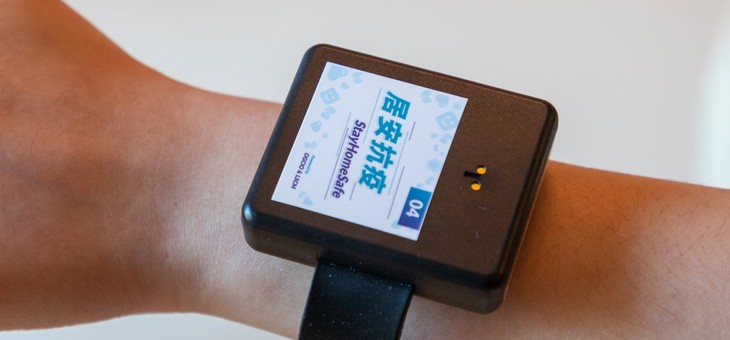Countries around the world are using tracking bracelets to deter people in quarantine from breaking the rules and spreading the virus throughout the community.
Singapore is the latest country to adopt this technology to monitor and potentially prevent community transmission from incoming travellers in quarantine.
Any incoming travellers over the age of 12 now need to wear the wristband if they’re not staying in a dedicated quarantine facility.
If they go outside their home or tamper with the device in any way, an alarm is sent to the authorities and penalties follow.
Bulgaria has introduced a device that can record residents’ movements using GPS satellite location data.
Hong Kong also uses the tracking device and a compulsory phone app for anyone self-isolating for two weeks after arriving from other countries.
In Lichtenstein, one in 10 residents has been given a band to track “temperature, breathing and heart rate, and transmit it to a lab in Switzerland for further investigation”. Later in the year, another 38,000 residents will be given a band.
South Korea, too, will force people to wear wristbands, but only if they breach quarantine orders.
Those quarantining in Poland are required to take selfies when prompted at random times of the day. These selfies are tracked using geolocation and facial recognition software to ensure they’re complying.
Taiwan also has an app to check that people are isolating.
In Belgium, wristbands that beep to warn of encroaching social distancing are being trialled. The wristbands beep if someone gets too close to another person.
Similar technology is being used in the isolated ‘NBA bubble’ which has allowed the American basketball season to resume in Florida.
Will Australia be next?
We’ve already seen many people flouting quarantine and self-isolation rules. It seems people just don’t take the virus or the rules seriously enough. Maybe, says Dr Marietta Martinovic, an expert in electronic monitoring at RMIT University, tracking devices should be considered.
“This is a very serious health issue, and we have to get people to care,” she told Law Report.
“One way of getting people to care is by imposing financial penalties … but also thinking about what some more stringent measures could be, and electronic monitoring is certainly an option.”
In Western Australia, $3 million has been spent on 200 GPS tracking ankle bracelets. The state government has also passed the necessary laws for their use.
So far, WA Police haven’t used them.
Will there come a day soon when tracking bracelets or similar technology are mandatory?
Dr Martinovic thinks there would be some benefit to the move, however there are pros and cons.
“We could be more, I suppose, secure that people will do the right thing. So that’s certainly a positive.
“I think there could be backlash by people who are mandated to use the technology.
“These are expensive devices … and then there’s all the manpower behind it all.
“There’s somebody that’s got to be tracking people, when an alert happens, there’s got to be a very strict process.
“There’s quite a lot that needs to go on in the background … the process of monitoring is quite substantial.”
She also said there would be a decision on whether to use bracelets to keep people isolated or notify people if they aren’t properly distancing and how personal information would be collected and stored.
“That’s always something we’ve got to keep at the back of our mind if we as a society, as a country, as a jurisdiction, go down the track of using technology for this purpose,” she says.
“Yes, right now it’s for the right reasons, one can argue, but in the future, we can never be so sure what those reasons are going to be.
“They could potentially be used by governments to control our movements.”
Dr Martinovic says though, that if people are aware they’re being ‘watched’, they’re more likely to be compliant.
Professor Liam Smith, who leads Monash University’s BehaviourWorks initiative, agrees. He says such devices would deter people from breaching the rules and would also likely influence others from doing so, but he doesn’t think they are necessary, yet.
“Regulatory theory tells us that if you punish those that are doing the flagrant acts of violating the law, and then make that really widely known, the ‘eavesdropper audience’ who are essentially those that may do the wrong thing, it can be quite dissuasive for them as well,” said Prof. Smith.
He said most people were already doing the right thing, and that “social punishment” along with substantial fines were enough to dissuade the majority from breaching the rules.
He added that public health messaging focusing on good examples helped to encourage people to do the right thing.
“Daniel Andrews tweeting out all the empty freeways and saying ‘thank you’, it’s been a really good example of social norming and positive language that will lead to more compliance because of it,” he said.
Would you be opposed to tracking bracelets being used to track the virus and people who are positive? What do you think encourages good behaviour?
If you enjoy our content, don’t keep it to yourself. Share our free eNews with your friends and encourage them to sign up.
Related articles:
https://www.yourlifechoices.com.au/health/covid19/contact-tracing-pivotal-who
https://www.yourlifechoices.com.au/health/covid19/why-we-should-test-65-million-a-day
https://www.yourlifechoices.com.au/technology/news/online-privacy-we-care–and-we-dont

